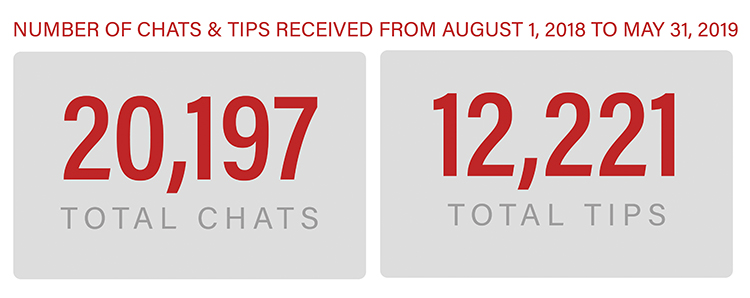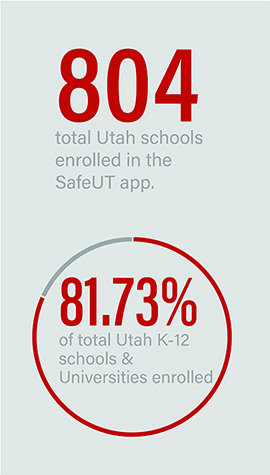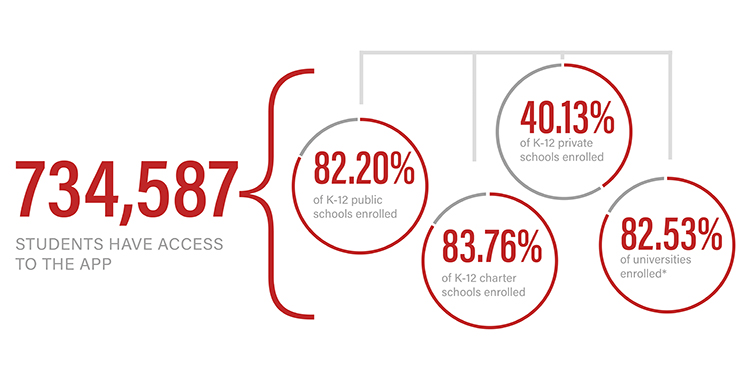Posts Tagged ‘Internet Safety’
Attorney General Reyes Challenges Utahns to Take the Safety Pledge in New Initiative to Keep Children Safe Online
FOR IMMEDIATE RELEASE
September 29, 2020
ATTORNEY GENERAL REYES CHALLENGES UTAHNS TO TAKE THE SAFETY PLEDGE IN NEW INITIATIVE TO KEEP CHILDREN SAFE ONLINE
SALT LAKE CITY – Utah Attorney General Sean D. Reyes is challenging Utahns to join him in a new safety campaign called “The Safety Pledge” to raise awareness of the risks that children face online, and in order to empower the children in their lives to respond to those risks safely. He has recorded a video taking the pledge and is challenging all Utahns from across the state, as well as state and local leaders, regardless of political affiliation, to join him in signing the Safety Pledge. Watch his video here.
The National Center for Missing and Exploited Children (NCMEC) is launching the Safety Pledge, a new campaign in cooperation with the White House. This initiative aims to provide free resources from the National Center for Missing and Exploited Children (NCMEC) to help parents, educators and other caregivers work together on protecting children online from exploitation and trafficking.
Today, Tuesday, September 29, NCMEC formally launched the Safety Pledge website. The website contains practical toolkits about internet safety. It also contains a Safety Pledge, which individuals can digitally sign and make their formal commitment to safeguarding children online. Attorney General Reyes is asking for individuals across the state to sign NCMEC’s Safety Pledge and join in our collective effort to prevent online child exploitation and trafficking.
The Attorney General’s Office invites everyone in the community to join this pledge. Strong participation is essential in order to spread the word about the information on this website that is designed to keep kids safe from the risks they face online. Check out the Attorney General’s Office social media for more about the Safety Pledge.
This morning, NCMEC conducted a webinar that provided training for teachers, parents, and caregivers on ways to protect children online. The program included remarks from senior officials from the White House, the Department of Justice, and the Department of Homeland Security. Watch the webinar, sign the pledge, and learn more at SafetyPledge.org.
###
Internet Safety Awareness Month
June 17, 2020
The past couple months, the Utah Attorney General’s Office has placed an emphasis on remaining safe online as telecommuting became the new normal and children began accessing the internet more for online classes and for entertainment while we practiced social distancing protocols. Even as the state begins to open up and restrictions loosen, it is imperative to remain diligent with staying safe online, whether it is with gaming platforms, online shopping, online meetings, or accessing the internet through a phone. June is Internet Awareness Month and with children out of classes and workspaces moved to online settings, it is more important than ever to familiarize yourself and your loved ones with safe internet practices.
Brush up on important online safety tips with the resources below:
- Keep your children safe online by following these tips. While accessing the internet to stay connected with friends and family is convenient, internet-accessible devices also create pathways for predators to reach your children. Read the tips in the link above to help teach your children online safety practices and stay up to date on things you should look out for while your family uses the internet.
- Use the tips outlined here to stay safe while telecommuting and using online meeting software. This software is convenient for holding meetings, classes, or connecting with friends and family. However, it is imperative that you stay aware and use online security tips and software to help prevent your video call from being hijacked.
- The Utah Attorney General’s Office is proud to partner with organizations and community partners that provide up to date resources on online safety. We are proud to partner with Digital Respons-Ability, an organization that provides training for you and your children and online safety resources to help keep your family safe.
- The Utah Department of Commerce recently launched the Utah Fraud Squad in an effort to help you avoid COVID-19 and stimulus scams. Check out their website for the latest in these scams: https://fraudsquad.utah.gov/index.html.
Additional Resources on Digital Safety for Parents
April 23, 2020
Earlier this month, the Utah Attorney General’s Office released online safety tips for parents during the COVID-19 crisis to help keep children safe while they access the internet more than normal while attending online classrooms and keeping in touch with friends in a socially distant environment. These tips included keeping an open dialogue with your children about online safety, being aware of the apps and internet sites your children frequent, and understanding the behavioral changes to look out for in your children that may indicate abuse, cyberbullying, or grooming by a predator.
Organizations with a primary focus on online safety, such as Digital Respons-Ability, provide up to date resources and training for you and your children. Digital Respons-Ability recently released additional resources for parents to help refresh on digital citizenship and help you create family plans for digital technology usage. These resources include:
- Training videos for elementary students, junior high and high school students, and for parents. For teachers and administrators, these videos are available on Moodle where you can have your students take an assessment at the end to receive a certificate of completion.
- Family media planning guides for ages 0-7, 8-12, 13-17.
For more information, contact Digital Respons-Ability at contact@respons-ability.net.
Online Meeting Safety Tips During COVID-19 Crisis
April 16, 2020
The Utah Attorney General’s Office is urging the importance of digital security and privacy as Utahns telework and use online meeting software. Recently, Governor Gary Herbert extended the “Stay Safe, Stay Home” directive during the COVID-19 pandemic until May 1, and announced that Utah K-12 schools will remain closed through the academic school year. For some companies and Utahns, that means a continuation of working from home and using video-teleconferencing (VTC) platforms to conduct business or stay in touch with friends and family, and children will continue doing schoolwork online.
It is imperative that Utahns use these interfaces safely and continue to implement internet safety into their online routines. There have been instances in Utah where meetings have been a victim to hijacking or “Zoom bombing”. Hijackers exposed victims to pornography, racial slurs, and explicit content. In an effort to protect workers, students, and Utahns, the Utah Attorney General’s Office is providing tips to help protect you and your families. Below are some safety tips for online security while using VTC platforms.
- Familiarize yourself with the software. Each VTC platform – such as Zoom, Google Hangouts, and Microsoft Teams – has its own security and software. Before you use a new platform, make sure you know how each software functions and how to use the security available to you.
- Do not make meetings publicly available. Do not share a link to a meeting or classroom on social media posts or on publicly available web pages. Only give the link to the guests you would like to attend the meeting or class. In Zoom, you have the option to use a meeting password and to use a “waiting room” feature that allows you to directly control the admittance of people into your meeting.
- Keep software up to date. Make sure the software for each meeting platform you are using is up to date. Updates to software contain security updates and remove bugs from the software. Additionally, make sure your computer and security software are up to date. This will add an extra layer of protection to your information and can detect and remove most malware.
- Be care of downloading files. If possible on the meeting platform you use, turn off the ability to transfer files. If you need to send and receive files during a meeting, you can send it through more secure channels. Before you download, make sure you know who the file is from. Whether it’s a link or a PDF, cybercriminals can trick you into downloading malware.
- Manage screensharing options. Unless your guests need to share their screen with the group, you can make adjustments to screensharing settings. In Zoom, you can change the screensharing option to “Host Only”.
- Always use internet safety. Whether you’re using the internet for school, work, or pleasure, always use internet safety. Be aware of scams and do not share personal information online. Always use updated software and security. Consider using a virtual private network (VPN) to help protect your information from getting into the wrong hands. If you are teleworking, check with your company’s telework policy and requirements for physical and information security.
For more information, read the FBI’s warning on teleconferencing and online classroom hijacking here. For tips to help keeps your children safe online during the COVID-19 pandemic, go here.
Online Safety Tips During COVID-19 Crisis
FOR IMMEDIATE RELEASE
April 9, 2020
UTAH ATTORNEY GENERAL’S OFFICE OFFERS ONLINE SAFETY TIPS
Parents and Children Should Keep Safety in Mind During COVID-19 Crisis
SALT LAKE CITY – The Utah Attorney General’s Office is offering tips to everyone who is concerned about online safety during the COVID-19 crisis. As schools closed and moved to an online setting, children are accessing the internet even more than normal. In addition to online classrooms, children are using the internet on phones, tablets, and gaming platforms to keep in touch with friends as communities adjust to staying indoors. While convenient for connecting with friends and family, these devices are also pathways for predators to reach our children. These predators are aware of the fact that children are spending more time online and unfortunately, may try to exploit that. Below are some items to raise your awareness of internet safety and provide tips on how you can protect your children:
- Talk to your children about being safe when using the internet. Keeping an open dialogue with your children will help them know that they can come to you for help if they have a problem online. Teach them about using the internet safely and help them learn what to look out for when it comes to cyberbullying, predators, and suspicious activity.
- Educate yourself. The first step to helping your children practice internet safety is understanding it yourself first. Get to know how online and phone apps and online schooling work. Always keep you and your security software up to date.
- Be aware of online activity. Predators can gain access to kids through online chats, through popular apps, and through gaming networks. Keep internet-accessible devices in a high-trafficked area such as the living room. Find out what apps your children use the most and learn how they work. Consider using parental controls on your children’s devices to help filter or block certain content online.
- Set boundaries. Talk to your children about what they should not post, such as personal photos, their location, and personal information about them. Consider creating an online safety agreement together so you can both agree on ways that personal devices and technology can be used, and how to use it safely.
- Always use security and a secure internet connection. Make sure all online accounts are set to private and always use secure passwords on those accounts. Make sure your security software is up to date and that you are using a secure internet connection.
- Look out for changes in your children’s behavior. Below are several examples of behavioral changes that you should look out for in your children. If your child exhibits these behaviors, it could be an indicator of abuse or grooming by a predator.
- Being secretive about sites they visit or who they are talking to online.
- Clicking off the page they’re viewing when a parent enters the room.
- Being online constantly and not being able to get off.
- Pulling away from friends and family.
- Using behavior or sexual language that is not appropriate for their age.
- Possessing new items or gifts.
- Volatile emotions, such as jumping from highs and lows within a matter of seconds.
- Be aware of apps that can hide other apps. There are a number of apps that allow you to hide content or apps from parents. One such app conceals another app behind a calculator interface.
- Know who your children are talking to online or on the phone. Make sure you know who is on their friend list online and who they talk to on the phone, through messaging apps, texting, and online chat forums. Make sure they know that if they are uncomfortable with someone who is messaging them, they can come to you for help.
“The online risk for kids has multiplied now that they’re at home and on computers for school instruction,” Attorney General Sean D. Reyes said. “I realize some homes have five or six kids online at the same time. It’s going to take extra vigilance when parents are already stressed out, but it needs to be done. I urge everyone to look at the tips our office is sending out. Don’t hesitate to report suspicious activity. This is all part of staying healthy and safe as a family at this difficult time.”
“While gaming and social media can be safe and fun diversions with proper supervision, parents need to be aware and proactive about their children online,” Attorney General Reyes added. “Young people are often exposed to mature content without even seeking it out. And many serious crimes victimizing children start with predators on the Internet.”
For more information and tips, visit Common Sense Media and Respons-ability.net.
###
Safer Internet Day: Together For a Better Internet
FOR IMMEDIATE RELEASE
February 11, 2020
SAFER INTERNET DAY: TOGETHER FOR A BETTER INTERNET
“Today, we encourage you to take the time to discuss internet safety with your children.” -Utah Attorney General Sean D. Reyes
SALT LAKE CITY — Safer Internet Day is today, February 11th and the Utah Attorney General’s Internet Crimes Against Children (ICAC) Task Force urges Utahns to get educated on internet safety to help prevent children falling victim to internet crimes. The best way to prevent these crimes is by educating yourself, your children, co-workers, teachers, etc.
Safer Internet Day is celebrated across the globe each February. This year’s theme is, “Together for a better internet”. The Utah ICAC diligently works to make the digital world safe from predators, cyberbullies, and other online dangers. We urge you to be kind and respectful to your peers online and to observe internet safety as you access the internet through your phone, apps, gaming platforms, and computers. No matter what you use, it’s important to practice digital safety.
We encourage you to read and utilize these resources on this and every day.
Below are some helpful resources to help you learn more about dangers your child may encounter online, and ways you can help prevent them:
For internet safety tips, go here.
More on Cyberbullying here.
Read the Safer Internet Day featured article, Sextortion: Stop It Before It Starts, written by Detective Christie Hirota from the Sacramento County Sheriff’s Office ICAC Task Force.
National Cybersecurity Awareness Month
October 29, 2019
October is National Cybersecurity Awareness Month and the Utah Attorney General’s Office is urging Utahns to stay safe online by using this year’s theme: Own IT. Secure IT. Protect IT.
With the internet integrated into almost every facet of our lives, from apps, smartwatches, smart home hubs and controllers, computers, and smartphones, it’s imperative to practice cybersecurity, no matter where you are or what you are doing.
Own IT
Update Privacy Settings
Your personal information is valuable, and you can control who and where you are sharing it. Make sure your update your privacy settings to your comfort level including geotagging, which allows anyone to see where you are at any given time.
Be Careful What You Click & Share
Seemingly random information, such as places you frequent, where you work, and where you live, can be everything a criminal needs to know in order to target you and your belongings – both in the real world and online. Always keep your Social Security number, birthday, address, full name, and passwords private.
Keep Tabs on Your Apps
Always get rid of apps you no longer use and review what permissions your apps have. Make sure you only download apps from trusted sources and enable automatic app updates so you can stay protected from cyber threats.
Secure IT
Double Your Login Protection with Secure Passwords
Having a strong password is imperative to keeping you and your information protected online. Be creative. Use a long password and don’t make passwords that would be easy to guess. Use a mixture of upper and lowercase letters as well as numbers and symbols. Lastly, enable multi-factor authentication. Learn more about this security process here.
How to Spot and Avoid Phishing
Scammers use email or text to trick you into giving up your personal information. These emails may appear as if they are coming from a legitimate company, website, or app. The email and text messages may tell you they’ve noticed suspicious activity on your account, claim there’s a problem with your billing information, include a fake invoice, or want you to click on a link to make a payment. Always double check the information by looking up the business entity and their information online.
Protect IT
Secure Your Wi-Fi Network
Before you make that purchase or send sensitive information, make sure you are connected to a secure network. Public, unsecured networks provide little security and allows people access to your files and information. Either use a virtual private network (VPN) or use your phone as a hotspot.
Stay Protected While Connected
Keep your software updated to the latest version available. Maintaining your security settings will keep your information secure and safe. You can enable automatic updates to run and enable your security software to run regular scans.
For more tips to protect your personal information, go here.
Sextortion: A Serious & Devastating Crime
July 2, 2019
A warrant was issued yesterday for the arrest of 19-year-old Gabe Ryan Gilbert for sextortion and/or coercion of another person. The charges are comprised of five counts of aggravated sexual extortion of a child, a first-degree felony, and four counts of sexual exploitation of a minor, a second-degree felony, after he allegedly contacted and threated juvenile girls on social media for nude photos.
The Internet Crimes Against Children (ICAC) Task Force started the investigation in August after receiving a report from Snapchat that a user had been sexual extorting minors online.
“When I examined the results of the search warrant from Snapchat it was obvious the user had been engaging in very similar behavior with other underage girls. I identified well over fifty (50) potential victims of this type of sexual extortion,” said an investigator in the charging documents.
Sextortion is a serious crime that occurs when someone threatens to distribute your private, sensitive material if you don’t provide sexual images, favors, or money. Generally, the perpetrator may threaten you or your loved ones unless you comply with their demands. Sextortion has serious and devastating effects on young victims and unfortunately isn’t uncommon with our technological world and various social media platforms where predators and perpetrators lurk.
Here are some tips to avoid becoming a victim to sextortion and what to do if you become one:
- Never send compromising images of yourself to anyone, no matter who they are or who they say they are. These images could easily be shared or stolen, even by people you may trust.
- Turn off your electronic devices and web cameras when you are not using them.
- Keep our internet safety tips in mind.
- If you receive sextortion threats, contact law enforcement or tell an adult. You are not alone, and you are not to blame.
The Internet Crimes Against Children Task Force (ICAC) is a multi-jurisdictional task force that investigates and prosecutes individuals who use the Internet to exploit children.
ICAC Tip Line: 801.281.1211
ICAC Email: utahicac@agutah.gov
Media Coverage:
Fox 13: Police: Utah man charged with sexual extortion threatened to expose teen girls, send ‘rapists’ to their homes
KUTV: Utah teen accused of sexual extortion of more than 50 girls, court documents state
KSL: Utahn accused in ‘sextortion’ of over 50 teens, charges say
Deseret News: Utahn accused in ‘sextortion’ of over 50 teens, charges say




